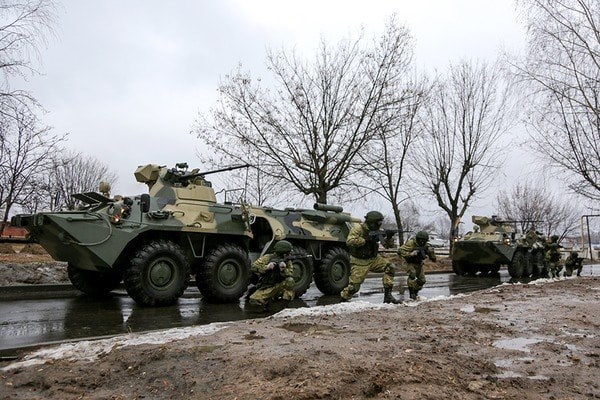Russia begins large-scale military drills near Ukrainian borders after inconclusive talks with the U.S.
Russia is launching a new series of military exercises in areas bordering Ukraine after the first round of security consultations with the United States, which ended on Monday and did not lead to concrete results.
About 3 thousand servicemen in the Voronezh, Belgorod, Bryansk and Smolensk regions will take part in firing drills that started on Tuesday, Interfax reports, citing the press service of the Western Military District.
About 300 units of equipment, including T-72B3 tanks, and BMP-2 infantry fighting vehicles will be involved in the exercises.
The purpose of the drills will be "combat coordination of various military formations" and the development of new methods and tactics of fire and artillery missions. The emphasis is planned to be made on use of small arms and firing from armored vehicles, as well as on the organization of rapid deployments and setting up fortifications to counter sabotage and reconnaissance groups of the hypothetical enemy, the Russian Ministry of Defense reported.
The maneuvers will take place at combined-arms training grounds and will end with a "training battle" with an imitation of strikes on enemy manpower.
At the same time, in the Crimea, units of the Marine Corps and engineering troops of the Black Sea Fleet, as well as artillerymen of the Army Corps of the Southern Military District, began to practice missile strikes. "More than 500 servicemen take part in field exercises. About 40 units of weapons, military and special equipment are involved," the press service of the Black Sea Fleet said. The exercises started the day after the long-awaited Geneva talks on Russia-US security guarantees.
The 8-hour meeting, where Russia was represented by Deputy Foreign Minister Sergei Ryabkov, and the U.S. by Deputy Secretary of State Wendy Sherman, ended without any progress on the three key requirements put forward by Moscow in December.
These are guarantees of non-expansion of NATO (including through the accession of Georgia and Ukraine), withdrawal of NATO’s military infrastructure to the 1997 borders, as well as the non-deployment of offensive weapons neat the territory of the Russian Federation.
The talks were "businesslike" and "professional", and the American side "approached the Russian proposals very seriously", "but, nevertheless, the main issues are hanging in the air, and we do not see that the American side understands the urgency of the solution in a way that suits us," Ryabkov stated after the talks.
Sherman, for her part, confirmed that NATO does not plan to abandon the principle of "open doors", and the United States will continue to cooperate with countries that want to join NATO.
The Russian delegation, according to Sherman, during the negotiations, did not give a direct response to calls for de-escalation of the situation around Ukraine, near the borders of which, according to American intelligence, a 100,000-strong group of troops has been deployed.
There are no reasons for optimism following the results of the first round of consultations, Russian presidential spokesman Dmitry Peskov said on Tuesday.
According to him, at the moment, there is not even a specific agreement on the continuation of contacts. "This will all be clear after the completion of the next two rounds," Peskov said, referring to the Russia-NATO Council scheduled for January 12 and the OSCE meeting on January 13.
